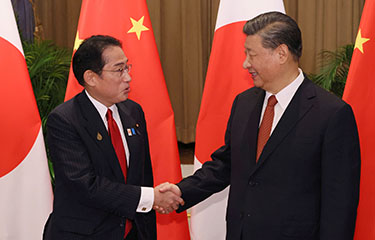A meeting between Japanese Prime Minister Fumio Kishida and Chinese President Xi Jinping has resulted in a handshake agreement that will see China review its ban on Japanese seafood.
China initiated a complete ban on seafood from Japan in August 2023, after it approved the release of treated wastewater from the damaged Fukushima Daiichi nuclear power plant. Russia followed with its own ban, and South Korea has maintained an earlier ban on seafood products from eight Japanese prefectures.
Meeting on the sidelines of the Asia-Pacific Economic Cooperation (APEC) meeting on 16 November in San Francisco, California U.S.A., Kishida and Xi agreed to seek ways “to find a resolution through consultation and dialogue based upon a constructive attitude,” Kishida told media outlets covering the event.
“In the days ahead, discussions will take place based upon science at the experts’ level,” Kishida said.
Kishida said his government will continue “pressing the Chinese government” and taking measures to support Japanese fishers, such as the subsidies provided to fishers and seafood companies impacted by the bans.
China, which said it implemented the ban to "prevent the risk of radioactive contamination of food safety,” has accused Japan of treating the ocean as if it were its own “private sewer.”
A third release of 7,800 tons of contaminated water from the Fukushima plant was initiated 2 November and was expected to last through 19 November. The release of the remainder of the 1.3 billion liters of contaminated water at the site is expected to take place over the next 30 years. The Japanese government, the International Atomic Energy Agency, and the U.S. government have said the release does not present a danger to the environment or to humans consuming seafood from Japan. The U.S. government and the Group of Seven (G7) has issued statements urging the end to all Fukushima-related seafood bans.
Kishida said Beijing should reevaluate its ban using an “objective judgment” on the safety of Japanese seafood, but acknowledged he did not secure any promise from Xi as to when China might actually lift the ban.
“Frankly, we are not at this point in a position to predict the timing of the lifting of the import restrictions,” he said.
In a statement issued after his meeting with Kishida, Xi did not elaborate on his stance on the ban.
“Japan should take seriously the legitimate concerns at home and abroad and handle the issue properly in a responsible and constructive manner,” Xi said, according to state news agency Xinhua.
Also at their meeting, Kishida expressed concern over Chinese military activity in international waters in the South China Sea. On 26 November, Japanese Foreign Minister Yoko Kamikawa met with China's top diplomat, China Communist Party Central Foreign Affairs Commission Director Wang Yi, and the two agreed that leaders of both countries should continue to converse to provide assurance neither provides a threat to the other. Following the meeting, China’s Foreign Ministry issued a statement suggesting Japan should implement an independent "long-term monitoring mechanism for all stakeholders” regarding Fukushima wastewater, according to Japan Today.
In a meeting with Kishida on 5 November, Malaysian Prime Minister Anwar Ibrahim also expressed concerns about monitoring of the wastewater, but said the country continues to allow all imports of all Japanese seafood. The IAEA confirmed on 2 November the third release of wastewater at Fukushima met its safety standards.
“While Japan has given its assurance that the release would have a negligible radiological impact on people and the environment, I have expressed my hope to Prime Minister Fumio Kishida for Japan to continue to take in the views and concerns we have expressed,” Anwar said.
Kishida and Ibrahim vowed to advance bilateral defense and maritime security cooperation, according to the South China Morning Post.
Japan's seafood exports to China plunged 90.8 percent in September 2023.
“Before the discharge began, we were worried that consumers may stay away from Fukushima fish, but we saw a significant increase of our customers asking for Fukushima fish,” Kinoshita said. “After China’s ban on Japanese seafood, we are seeing more customers buying not only Fukushima fish but also Japanese seafood in general to support the industry.”
Photo courtesy of Prime Minister’s Office of Japan







